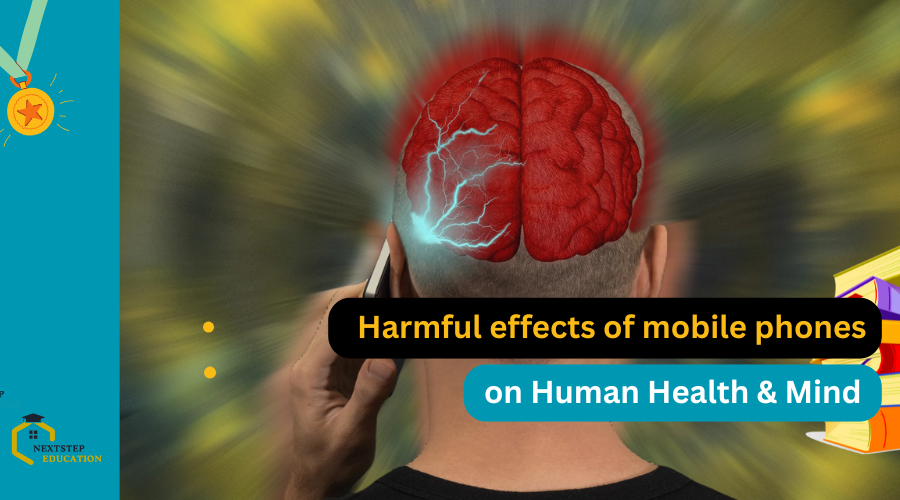Mobile phones have become an intimate part of modern life. From staying united with loved ones to managing work, entertainment, and education, smartphones serve countless purposes. However, their growing presence in our daily routines—especially among students, teenagers, and professionals—has increased serious concerns about health and mental well-being.
While mobile phones offer convenience and productivity, excessive usage can lead to harmful side effects. From sleep disorders and eye strain to mental stress and reduced academic performance, the impact of mobile phone overuse is both physical and psychological. Many users, often unknowingly, fall into patterns of habit that interfere with personal development, social life, and emotional stability.
In this blog, we explore the 15 major harmful effects of mobile phones on health and the mind, backed by real-life observations and behavioral studies. Whether you\’re a student, parent, or working professional, understanding these risks can help you make healthier choices in your digital lifestyle.
5 harmful effects of mobile phones on health and the mind
Sleep Disruption and Insomnia
Using mobile phones late at night can severely affect your sleep. The blue light radiated by screens suppresses melatonin, the hormone that regulates sleep, making it harder to fall asleep or stay asleep. Scrolling social media or watching videos before bed also overstimulates the brain, leading to restless nights and exhaustion the next day.
Eye Strain and Vision Problems
Extended screen time causes digital eye pressure, also known as Computer Vision Syndrome. Symptoms include dry eyes, blurred vision, headaches, and even difficulty focusing on distant objects. With smartphones held close to the eyes for long hours, this strain increases, especially in students who use them for both study and entertainment.
Increased Anxiety and Stress
Constant notifications, pressure to stay updated on social media, and fear of missing out (FOMO) contribute to heightened anxiety levels. Mobile overuse has been linked with increased cortisol (stress hormone) levels, leading to mental fatigue and emotional instability over time.
Decreased Attention Span
Frequent mobile usage trains the brain to seek instant gratification, reducing our ability to focus on long-form tasks. Students who change between studying and mobile apps find it harder to keep information, leading to poor academic performance and scattered thinking.
Mobile Phone Addiction (Nomophobia)
Nomophobia, or the fear of being without a mobile phone, is a growing psychological issue. Signs include anxiety when the phone is out of reach, compulsive checking, and prioritizing screen time over real-life responsibilities. This form of digital dependency can harm emotional well-being and personal growth.
Hearing Damage
Listening to music or videos on mobile phones using headphones at high volume can cause long-term damage to your ears. Continuous openness to loud sounds can damage the delicate hair cells in the inner ear, leading to hearing loss, ringing in the ears (tinnitus), and reduced audio sensitivity, especially among teens.
Radiation Exposure
Mobile phones emit low levels of non-ionizing radiation. Though ongoing research is still examining the full impact, excessive and long exposure has been associated with potential risks like headaches, fatigue, and—in extreme cases—possible links to brain cell alteration. Holding the phone close to your head for long calls may increase exposure levels.
Neck and Spine Problems (Text Neck)
Bending your head downward to look at your phone for hours can lead to a condition commonly called \”text neck.\” It strains the neck, upper back, and shoulder muscles, potentially leading to poor posture, chronic ache, and long-term spinal issues.
Reduced Social Interaction
Excessive phone use reduces meaningful, face-to-face communication. People—especially students and young adults—may begin to prefer texting over talking, leading to weak interpersonal skills, social aloneness, and difficulty in forming real relationships.
Decline in Academic Performance
Constant mobile distractions—like chatting, gaming, and social scrolling—during study hours lead to reduced concentration and efficiency. Multitasking between apps and learning material hampers memory retention and directly affects grades, focus, and self-discipline in students.
Increased Risk of Depression
Multiple studies have linked excessive mobile phone usage—especially time spent on social media—with symptoms of depression. Constant comparison, cyberbullying, and digital validation-seeking contribute to feelings of inadequacy, low self-esteem, and emotional exhaustion.
Obesity and Physical Inactivity
Spending hours on mobile phones often replaces physical activity, leading to a passive lifestyle. This lack of movement can cause weight gain, reduced stamina, and a higher risk of diseases like diabetes, high blood pressure, and heart problems.
Weakened Immunity
Poor sleep, stress, and physical inactivity—caused by phone overuse—can lower the body’s immune protection. Over time, this makes individuals more susceptible to infections, fatigue, and slower recovery from illness.
Aggression and Irritability
Excess screen time, especially exposure to violent or hyper-stimulating content (games, videos), can lead to irritability, anger, and emotional outbreaks, particularly in children and teens. Digital overload overstimulates the nervous system and reduces patience and emotional control.
Weaker Family Bonds and Communication Gaps
When mobile phones take priority over family conversations and shared activities, emotional distance grows. Overuse during meals, gatherings, or quality time reduces bonding, causing misunderstandings and weakened relationships, especially between parents and children.
Why Students and Teenagers Are Most at Risk
Students and teenagers are among the most vulnerable when it comes to the negative impact of mobile phone overuse. Their developing brains and habits make them more prone to digital dependency and emotional instability. Here\’s why:
-
Excessive Screen Time: Teens often spend 6–9 hours a day on their phones for social media, gaming, videos, and chatting, much higher than the recommended limits.
-
Academic Distractions: Constant pings and multitasking reduce focus during study time, resulting in poor academic performance and time mismanagement.
-
Emotional Sensitivity: Adolescents are more emotionally reactive, making them tolerant of online comparison, cyberbullying, and FOMO (Fear of Missing Out).
-
Poor Sleep Habits: Students using phones late at night often suffer from irregular sleep cycles, which affect concentration, memory, and mood the next day.
-
Social Withdrawal: Over-dependence on virtual interactions can weaken face-to-face communication skills, leading to isolation and reduced social confidence.
-
Physical Inactivity: Scrolling for long hours replaces outdoor play and physical activity, increasing the risk of obesity, poor posture, and lifestyle-related illnesses.
These factors combined make it essential for students, parents, and educators to monitor and manage mobile phone use actively.
Tips to Reduce Mobile Phone Overuse
Reducing mobile phone usage doesn’t require cutting off completely—it’s about building healthier habits and setting boundaries. Here are practical tips to help manage screen time effectively:
1. Set Daily Time Limits
Use in-built digital wellbeing tools or apps like Digital Detox, Forest, or Screen Time to set clear usage limits for apps like Instagram, YouTube, or gaming.
2. Avoid Using Phones Before Bed
Establish a “no screen” rule at least 1 hour before sleeping. Instead, try reading a book or journaling to unwind naturally.
3. Create a Schedule
Plan your day with fixed time blocks for study, phone use, meals, and rest. This improves time management and reduces random scrolling.
4. Designate No-Phone Zones
Avoid using phones during meals, in the bathroom, or while studying. Keep the phone in another room when deep focus is needed.
5. Practice Mindful Usage
Before picking up your phone, ask yourself: “Is it urgent or necessary?” Deliberate usage helps reduce the habit of checking phones out of boredom.
6. Replace Screen Time with Offline Activities
Examine hobbies like painting, music, writing, walking, or sports. Keeping your mind and hands busy reduces the craving to scroll.
7. Involve Family and Friends
Set collective screen time goals with your family or roommates. A shared commitment boosts accountability and motivation.
Healthy Alternatives to Mobile Engagement
Breaking mobile overuse habits becomes easier when you replace screen time with fulfilling, real-world activities. These options promote mental clarity, emotional balance, and physical health.
1. Read Books or Journals
Develop a reading habit—be it fiction, biographies, or self-help. Reading boosts imagination, vocabulary, and critical thinking.
2. Engage in Creative Hobbies
Try painting, writing, photography, knitting, or craftwork. Creative expression reduces stress and builds focus.
3. Exercise or Play a Sport
Physical movement releases endorphins, improves stamina, and resets the brain. Join a dance class, gym, yoga class, or simply go for a walk.
4. Practice Mindfulness & Meditation
Mindful breathing and meditation help reduce screen dependency by calming the mind and increasing self-awareness.
5. Spend Time with Family & Friends
Have meaningful, in-person conversations. Play board games, cook together, or go for an outing without phones.
6. Listen to Music or Podcasts (without screen)
Engage your senses without staring at a screen. Choose audiobooks or learning podcasts that enrich your time and knowledge.
7. Maintain a Journal
Writing your thoughts or goals in a journal every day can declutter the mind and reduce the urge to escape into your phone.
Conclusion
Mobile phones are undeniably one of the greatest inventions of our time—connecting people, offering knowledge, and powering innovation. But when overused or misused, especially by students and young adults, they can silently corrupt our physical health, mental well-being, academic performance, and personal relationships.
The harmful effects of mobile phones—ranging from sleep disruption and anxiety to social isolation and physical problems—should not be ignored. Awareness is the first step. By understanding these risks and taking deliberate action to balance screen time, we can enjoy the benefits of technology without becoming controlled by it.
A healthy digital lifestyle is all about mindful usage, real-world engagement, and personal discipline. Start small, stay consistent, and protect your health for today and the future.
Frequently Asked Questions (FAQs)
Q1. What are the most harmful effects of mobile phones on health?
The most harmful effects include sleep disruption, eye strain, increased anxiety, posture problems, and mobile addiction. Over time, these can lead to more serious issues like depression, obesity, and weakened immunity.
Q2. Can mobile phone radiation cause long-term health issues?
While studies are ongoing, long-term exposure to mobile phone radiation may affect brain cells and tissues. Using speaker mode or earphones can reduce direct exposure to your head.
Q3. How do mobile phones affect students’ academic performance?
Constant notifications and screen time distract students from studying, reduce attention span, and interfere with memory retention, leading to poor academic outcomes.
Q4. What are the early signs of mobile phone addiction?
Feeling anxious without your phone, compulsive checking, lack of focus, and reduced social interaction are some early signs of phone addiction.
Q5. How much screen time is healthy for teenagers?
Experts recommend limiting recreational screen time to 2 hours per day for teenagers, excluding school-related use.
Q6. How can I reduce my mobile phone usage without quitting completely?
Start by tracking your screen time, setting daily limits, turning off non-essential notifications, and replacing screen time with offline hobbies or activities.





